
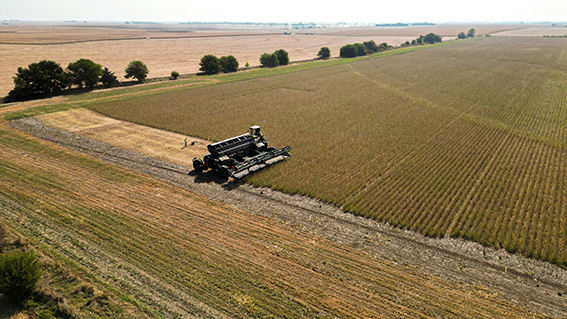
Ones to Watch: Molecular Harvest
As molecular farming gains momentum, plants are emerging as powerful biofactories for producing animal proteins, enzymes, and growth factors. With scalability, cost-efficiency, and sustainability at its core, Amity Reed discovers a future of food that’s rapidly taking shape
With investment in molecular farming growing nearly as rapidly as the technology that drives its advances, it is unsurprising that the industry is estimated to reach US$3.5 billion by 2029. A variety of applications in food, pharmaceuticals, and cosmetics – including cutting-edge mRNA vaccines such as those developed in response to the COVID-19 pandemic – make it one of the most exciting scientific areas to work in, too. But why is this fascinating blend of genetic engineering and traditional agriculture taking root now, and what is its future in food?
Compared to other non-animal protein production methods like precision fermentation and cell cultivation, plant molecular farming (PMF) has lower startup costs and scales easily by planting more crops. Introducing genetic material into plants allows for high-yield protein production – altering both quantity and type without compromising plant integrity – offering another key advantage. PMF isn’t limited to meat proteins however; it also produces egg and dairy proteins such as ovalbumin, casein, and whey, along with bioactive compounds like enzymes and growth factors for therapeutic use.
Crops with a cause
In terms of food security and sustainability, molecular farming offers other advantages, too. Beyond extracting animal proteins from host plants, PMF can create nutritionally complete plant sources. Potatoes are a great example of this. Already a globally available source of carbohydrates, fiber, vitamins, and minerals, genetic modifications that enrich its protein value significantly could help combat food scarcity and malnutrition in developing regions where access to diverse sources of protein is limited. The same applies to crops such as corn, rice, and soybeans, making this work vital – not just for extractable proteins in foods, but as a breakthrough in combating hunger.
As more PMF companies enter the market and awareness of its potential grows, dispelling misconceptions becomes even more crucial. Alongside regulatory challenges and safety concerns that must be addressed, proving to the food industry and public that PMF is a viable and desirable protein solution is crucial. But with visionary leaders like those profiled here leading the way, the future of food is looking decidedly molecular indeed.
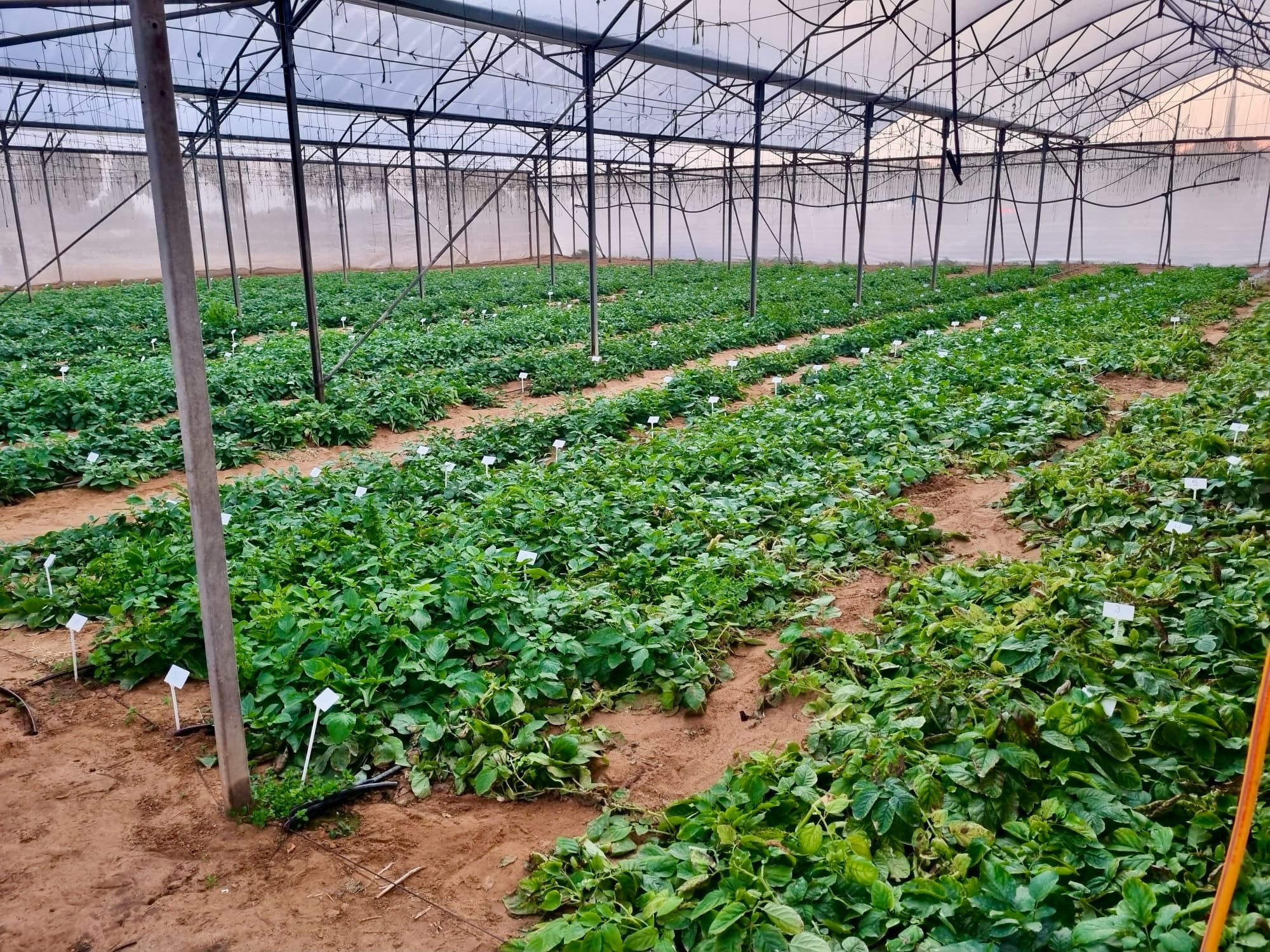
PoLoPo
If someone had to imagine what plant species might be utilized as a host for ovalbumin, the protein found in egg whites, the humble potato would probably not be their first guess. But as a staple in much of the world’s diet, the potato’s potential as a protein-enriched food lies not only in its widespread availability, but in its versatility, too.
Maya Sapir-Mir, CEO of Israeli company, PoLoPo, explains why the food tech chose it as the host plant for its molecular farming platform. “In terms of efficiency, potatoes offer a high yield per unit area, low growth maintenance costs, and a large soluble sink organ, making them an ideal host for protein accumulation,” she says. “They are also resilient to varying weather conditions and have a solid transformation method.” In that sense, plant molecular farming is remarkably similar to traditional agriculture, requiring many of the same conditions for successful growth and harvesting.

Resilience and ubiquity of the product are key components of its appeal, but beyond efficiency lie additional advantages. Describing the properties that make potatoes an ideal host, Sapir-Mir states, “The proteins we extract, such as patatin, have high nutritional quality with essential amino acids, are non-allergenic, and have a neutral taste, making them an ideal food application.”
The plant’s naturally low protein content makes the process of genetic modification simpler, too, she suggests. “Once we introduce our genetics and the protein level is increased, it’s much easier to shift expression toward your target protein and extract it in cost-effective production.” Ensuring consistent protein expression is achieved through directed metabolic engineering, utilizing a number of processes. These include over-expressing genes to enhance amino acid metabolism, directed organ expression (e.g. tubers), and precision timing of expression at targeted tissues during plant growth.
Smart starch, smarter proteins
With an established supply chain and robust infrastructure already in place for potato farming, the high costs associated with building specialist facilities (such as those required for fermentation processes) are avoided, providing an economic advantage as well. “The potato industry already has established downstream processing (DSP) facilities worldwide, especially for starch extraction, which allows for efficient protein recovery,” Sapir-Mir reports. But existing infrastructure isn’t the only scalability benefit for PoLoPo. The potato’s unique properties mean that yield is more easily controlled in the growth environment. “Unlike other plants used for molecular farming, potatoes do not generate seeds, preventing uncontrolled mixing with non-GMO harvests,” she adds. This is an important component of ensuring regulatory compliance and in the protection of surrounding ecosystems.
Sustainability played a key role in PoLoPo’s choice of potatoes, which require far less water and land than soy. Ensuring food security also means addressing GMO misconceptions. “Without genetic engineering, we cannot produce enough food sustainably,” says Sapir-Mir. “Early GMO crops had issues, but today’s strict regulations and advanced tools ensure responsible use for consumer benefit.”
Today, we have the tools and strict safety regulations to ensure GMOs are used responsibly and for the benefit of consumers
Despite the numerous advantages the host plant provides, PoLoPo did encounter some challenges with transitioning from lab-scale proof-of-concept to field-scale production. “A strict planting timeline in September to October meant a sufficient plant population had to be generated quickly in order to meet the field trial deadline,” Sapir-Mir reveals. “Before having a seed manufacturing capacity, it was difficult to scale up trials. Despite this, we successfully generated a population large enough for field trials, using genotype screening to select only the most efficient and productive plants.”
With its SuperAA molecular farming platform enabling high-yield, scalable production, Sapir-Mir is excited about the future of both PoLoPo and food. “The real breakthrough for consumers will be our whole potato,” she says. “We are transforming potatoes into superfoods with high protein content, reinventing a staple crop to be more nutritious and sustainable. Imagine a potato with as much protein as an egg – this is the future of functional, nutrient-dense foods.”

Plantopia
Standing out from the crowd can be difficult when working in a field of emerging technology that is constantly changing, with new innovations happening all the time. For a molecular farming company to differentiate itself from its competitors, it must have a truly unique product and approach. Israeli company, Plantopia, manages this impressively, with its choice of host plant (oats), successful expression of all four key casein proteins (alpha S1, alpha S2, beta, and kappa), use of indoor and vertical farming methods, and pragmatic business model.
The decision to take a controlled approach to crop cultivation has proven to be a major advantage in regulatory approval. By eliminating unintended cross-contamination and environmental exposure with its use of contained, biosecure enclosures, Plantopia has not only streamlined the path to market through a de-risked regulatory framework, but in optimizing production, too. Describing some of the key benefits of this approach, Chief Commercial Officer Noah Klein says, “Plantopia stands out in molecular farming because we are laser-focused on cost efficiency, regulations and scalability, without compromising on quality. While others in the space are developing casein in various plant systems, our platform is uniquely designed for indoor and vertical farming, enabling precise control over production and ensuring regulatory alignment – a major advantage in bringing molecular farming to market.”

Having made significant progress on the path to FDA and USDA approval, Plantopia is actively preparing for assessment with protocols in place for identity and safety testing, reinforcing confidence in its approach. Its transgenic oat sprout, as currently engineered, avoids many of the regulatory hurdles faced by other molecular farming platforms due to its non-regulated status. Confirmation of this official status is in the process of being finalized, moving Plantopia further toward commercialization. This has provided real-world validation of its methodology, with opportunities for partnership with food manufacturers.
“One of the strongest validations of our technology came from Tnuva, Israel’s largest dairy company, which controls more than 70% of the dairy market,” Klein reports. “Tnuva, which is part of the Fresh Start accelerator that invested in Plantopia, recently assessed our casein and their feedback was clear: the functionality and performance of our casein actually exceeded that of animal-derived casein. They were deeply impressed with its ability to deliver the stretch, melt, and structure required for dairy applications.”
Resilient roots
With their focus now on commercialization within the US market, Plantopia is engaging with leaders in the dairy industry, food manufacturing, ingredient supply, and food-service to bring its product to the world. Klein’s remit is to lead this effort, bridging their innovation hub with the leading commercial players in food and biotech. Discussing some of the challenges the company has overcome to achieve its success, he states, “One of the biggest lessons we’ve learned is resilience in the face of unexpected challenges. When the war in Israel broke out, our facilities – including offices, lab, pilot, and greenhouse – had to be completely shut down, disrupting months of work. But the team didn’t stop.” He continues, “We adapted, pivoted where needed, and proved that there is always a way forward when the mission is clear. That resilience has become part of Plantopia’s DNA.”
This isn’t a ‘mimic’ or a plant-based alternative that tries to be like cheese – it is cheese, because the casein is real casein
Another core part of its DNA is enthusiasm for real-world applications and consumer response. “We’re most excited for consumers to taste non-dairy alternatives, like mozzarella, that aren’t a compromise,” Klein says. “This isn’t a ‘mimic’ or a plant-based alternative trying to be cheese – it is cheese, because the casein is real. With Plantopia’s casein, consumers will finally get animal-free dairy that delivers the full experience they love.”
Klein sees reducetarians, who make up 42% of consumers, as a key target market. More people are seeking alternatives without fully switching, and Plantopia is ready to meet that demand. “Until now, they’ve had to choose between sustainability and a great eating experience,” Klein says. “We’re here to change that. The future of dairy is delicious, accessible, and uncompromising.”
.jpeg)
Mozza Foods
Though largely viewed as a new technology, molecular farming has a longer history than most people think. Genetic engineering techniques have been used for decades to help crops withstand droughts and thrive in conditions not normally suitable for them, and in the production of pharmaceuticals. Adam Tarshis, CEO of Mozza, explains what initially drew him to the industry and why using these proven techniques to develop alternative sources of protein is so important. “There are so many things that excite me about molecular farming,” he begins. “For the first time, there’s a clear path to producing animal proteins for less than it costs to raise animals we’ve traditionally relied on. If we can produce these proteins at a lower cost, alternative proteins will finally have a real shot at being accepted and adopted by the market.”
.jpg)
With a focus on creating casein protein in its soybean host, Mozza sees the benchmark for success as achieving cost parity with cow’s milk. It is estimated that to do so would require converting about 7% of the protein found in a soybean seed to casein. Tarshis believes that Mozza is on track to achieve this, with expression levels in its seeds increasing roughly tenfold each year for the past two or three years. “We’re on track for another threefold to tenfold improvement this year and are targeting seeds with casein comprising about 1-3% of the total protein content by the end of 2025,” he reports. “If we hit those targets, we’ll be very close to achieving cost parity with cow’s milk. In dollar terms, that would put us at about three to four times the current cost of cow’s milk – significantly narrowing the gap.”
Patience pays off
Once the desired protein content level in the host plant is reached, scaling up becomes the next challenge. When compared with a process such as precision fermentation – which has a much faster life cycle – plants require more time for growth and regeneration. As a result, the biological processes and R&D stages are often more complex. “However, once those initial challenges are solved,” Tarshis continues, “scaling in the field becomes far easier than with precision fermentation or cell culture. And that, to me, is the huge advantage molecular farming brings to the space.”
Purification is another potential scaling challenge, but one that Mozza addresses with its in vivo micelle solution. With casein micelles being larger structures that are not as easily separated by size, as is typically done in large-scale manufacturing, Mozza found that separating the proteins from the plant material itself was more efficient. Taking those extra steps to engineer complete micelles inside the seeds has produced exciting results for the company, and improved its scalability potential in the process.
Moving from concept to reality is an important step for any food-tech company, with partnerships playing an important role. Tarshis shares some of the key milestones Mozza has reached recently, reporting, “We just completed our third year of USDA-permitted field trials for our casein-producing seeds in the USA. Now, we’re pursuing USDA approval to plant these seeds without the need for permits. On the commercial side, we’ve signed NDAs and letters of intent with several major players, including Danone, Bel, Kraft, and a number of other European and USA-based dairy manufacturers.” All being well, Mozza expects to have large-scale samples in customers’ hands by late 2025.
For the first time, there’s a clear path to producing animal proteins for less than it costs to raise animals we’ve traditionally relied on
Looking ahead, Tarshis expects molecular farming to gain traction in the alternative protein sector. With production refinements, cost parity, and commercialization advancing, progress is on the horizon. “Dairy companies have ambitious sustainability targets for 2030,” Tarshis says. “As molecular farming products become true drop-in replacements – matching bovine milk in taste, texture, and cost – major dairy players will increase support and adoption.”
Getting the products into consumer hands is the ultimate goal for Tarshis, seeing them discover cheese and ice cream that not only tastes good but helps the planet and animals, too. “That’s exactly why I, along with everyone at Mozza, do the work we do.”
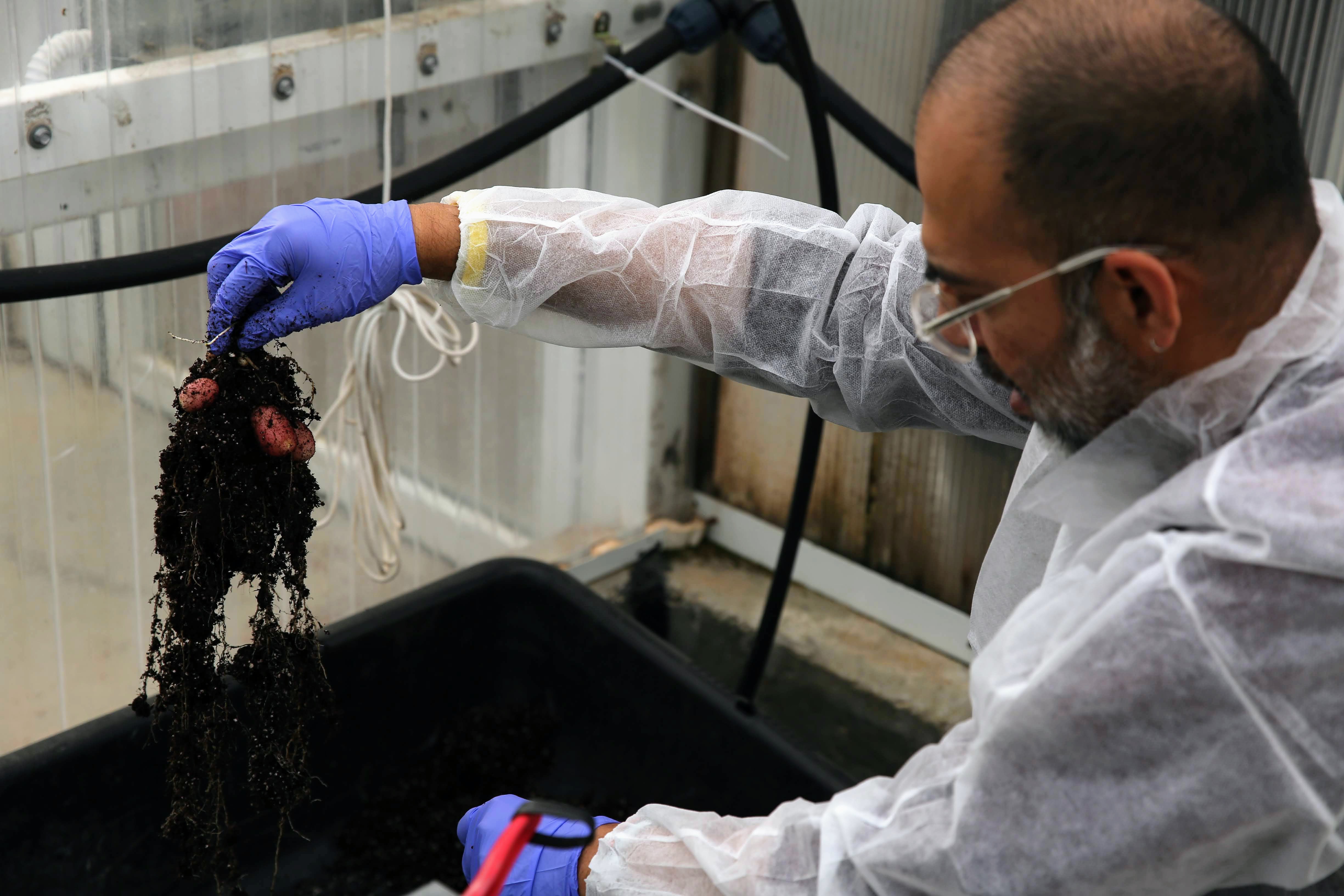
Finally Foods
In the emerging field of molecular farming – where plants are genetically modified to express animal proteins – misconceptions abound. Dafna Gabbay, Co-Founder & CEO of Finally Foods, an Israeli startup using potatoes as its primary plant host, aims to clear them up. “One of the biggest misconceptions is that extracting target proteins from plants is costly and inefficient,” she says. “While this may be true for crops such as soy – where separation is complex and expensive – Finally Foods has shown that protein extraction from potatoes is both feasible and commercially viable.”
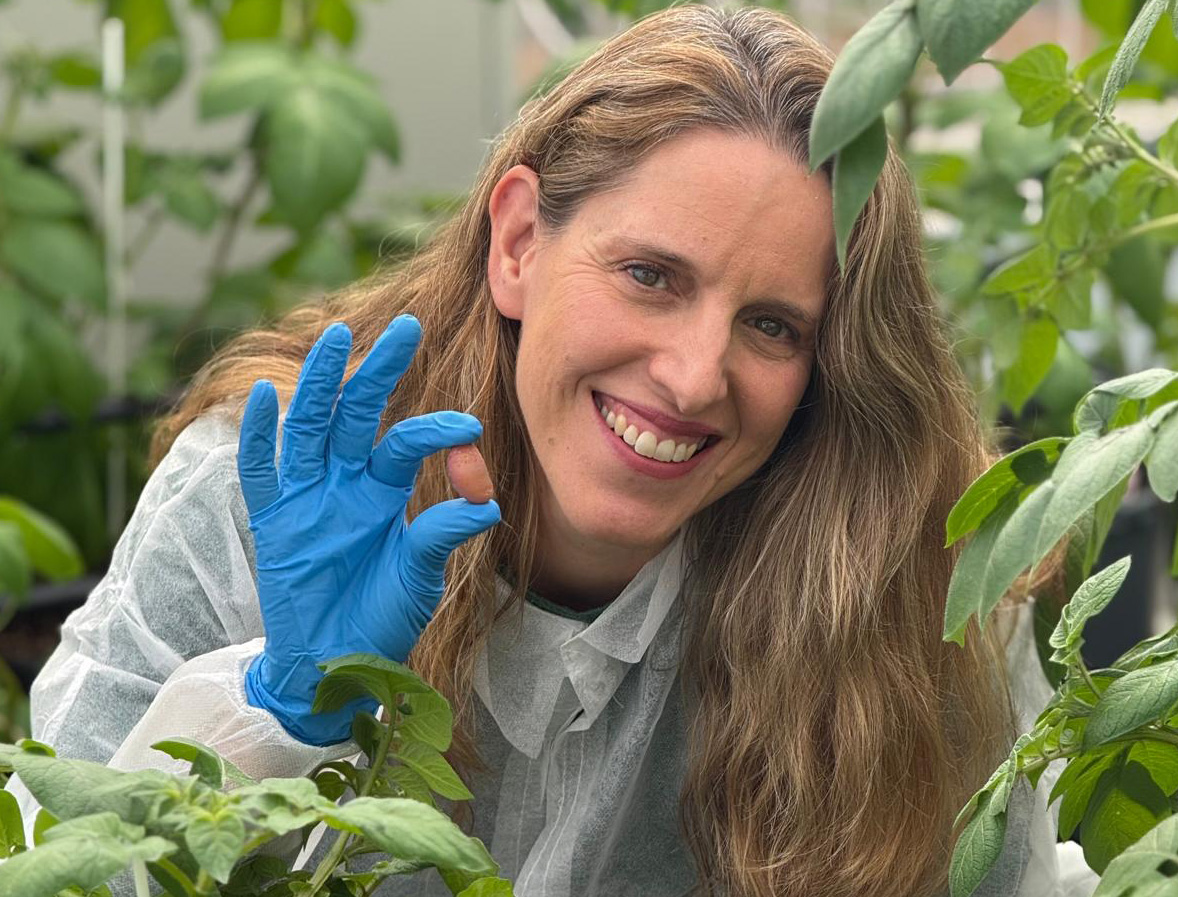
Compared to precision fermentation and cultivated cells, plant molecular farming avoids expensive bioreactors and costly inputs, making it highly cost-effective. Finally Foods’ choice of potatoes enhances this viability, as their natural genetic capacity for high protein expression makes them ideal for producing complex proteins like casein – the key to cheese’s distinctive texture. The company focused on casein to help create a new generation of plant-based products that aren’t ‘almost‘ or ‘taste like’ alternatives, but the real thing.
Maintaining consistent protein levels across batches and environments is crucial. “We leverage the clonal propagation nature of potatoes,” Gabbay explains. “Each plant is genetically identical, reducing batch variability. Unlike sexually propagated crops, which introduce genetic variation, potatoes retain a stable genetic profile, ensuring uniform protein production across cycles.” This stability makes the process reliable, scalable, and commercially viable, with minimal environmental impact.
When asked about Finally Foods’ purification methods for extracting and refining target proteins, Gabbay explains the company’s unique approach compared to traditional bioprocessing. “In the potato processing industry, protein recovery has typically been a byproduct of starch extraction, with most industrial processes prioritizing starch yields while recovering minimal protein,” she says. “At Finally Foods, we reversed this approach – our process prioritizes protein extraction, with starch as a secondary byproduct. By optimizing purification parameters and leveraging insights from our proprietary AI-driven molecular farming system, we ensure high casein purity and functionality, making it ideal for dairy applications.”
Coding casein
The importance of the expression platform in molecular farming cannot be understated, especially when an innovative company is looking to differentiate itself from its competitors. Backed by Evogene, a leading computational biology company that utilizes AI technology to empower development of novel life-science based products, Finally Foods is able to design and optimize the genetic sequences used to modify the host plant. In addition, the platform allows for enhanced protein design through extensive modeling, optimizing the potato’s genetic pathways for casein extraction. “This cutting-edge approach has allowed us to reach our first field trial in record time – just 10 months after formation,” Gabbay states. “In this short period, we successfully finalized the potato’s expression system, designed the casein, conducted all necessary tissue culture work, and cultivated the potatoes in the greenhouse. By drastically reducing the traditional trial-and-error process, our AI-driven molecular farming strategy greatly accelerates time to market, positioning us as a frontrunner in sustainable dairy protein production.”
By drastically reducing the traditional trial-and-error process, our AI-driven molecular farming strategy significantly accelerates time to market
A strong emphasis on the R&D phase of upstream development and identifying the simplest, most cost-effective extraction processes have enabled Finally Foods to produce solutions that are not only sustainable but fully optimized for efficiency. Gabbay believes this is where the greatest opportunities lie. “Molecular farming presents a game-changing opportunity to produce high-value proteins at scale, leveraging existing agricultural and industrial processing infrastructure,” she says.
With multiple collaborations and discussions with other companies underway, the introduction of plant-produced casein protein integrated into the existing dairy and alternative protein markets is on the horizon, with Finally Foods set to be a key player.
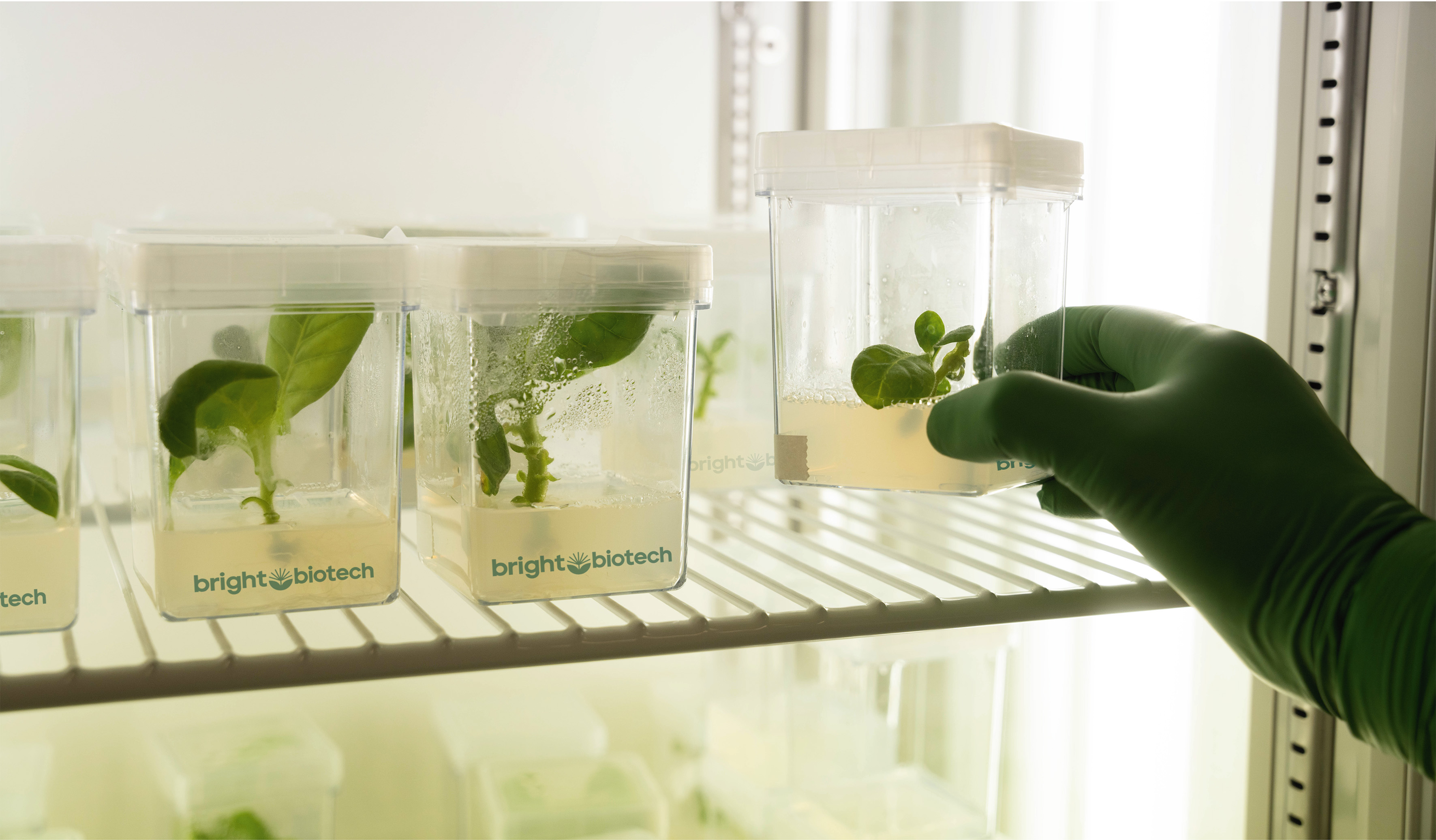
Bright Biotech
As part of what might already be considered a ‘next-gen’ approach in plant molecular farming, Bright Biotech has developed remarkably precise methods that set it apart from many of its competitors. Unlike conventional genetic modification methods that insert genes into the plant’s nuclear DNA, the UK company uses chloroplast transformation to target highly active regions of the chloroplast genome. This prevents gene silencing from occurring, resulting in a stable and consistently high yield across batches and environmental conditions.
Mohammad El Hajj, Bright Biotech’s Co-founder & CEO, explains the vector system and transformation method used to introduce genes into Nicotiana (tobacco) plants. “The DNA that we introduce includes guiding sequences that match specific locations in the chloroplast genome,” he explains. “When the plant’s natural repair system detects this new DNA, it precisely integrates it at the intended spot, ensuring reliable expression. We coat microscopic gold particles with the target DNA and deliver them into plant cells using a biolistic system. Once inside, the DNA naturally finds its way to the chloroplasts and integrates through homologous recombination.”
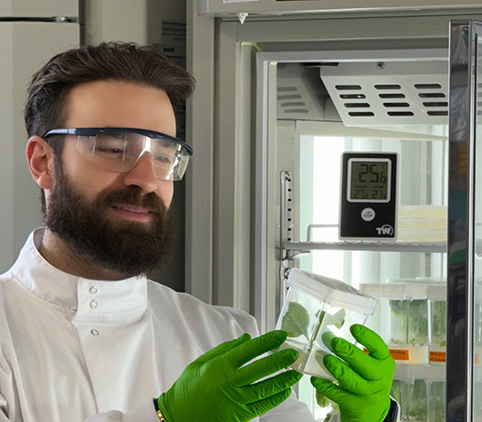
The advantages of using this method are numerous. Not only does it ensure a more efficient process and consistently high protein yield, it eliminates the variability caused by random insertions, a common issue in nuclear transformation. And unlike traditional GMOs, chloroplast DNA is inherited only through the mother plant, meaning it does not spread its pollen. This is especially important when preventing cross-pollination with other crops, a regulatory requirement designed to reduce ecosystem disruption and, for consumers, exposure to unexpected allergens. By harvesting leaves before flowering, seed dispersal is further reduced, ensuring biosafety compliance. Expanding on this, El Hajj adds, “While our genetic approach minimizes variability, we further ensure batch-to-batch consistency by maintaining controlled cultivation conditions, including standardized lighting, temperature, humidity, and nutrient delivery, as well as optimized plant density and harvesting schedules to achieve uniform protein accumulation.”
Faster farming
Even with this targeted approach, bottlenecks can still arise with plant molecular farming when compared to other methods of production. Unlike microbial systems that produce proteins in days, plant-based systems follow natural growth cycles, meaning production takes weeks to months. Plant regeneration from seeds adds time to the process. So, how is Bright Biotech addressing these challenges? “We are optimizing our chloroplast transformation protocols to shorten development time, integrating color screening for faster selection and using seed amplification for rapid scale-up,” El Hajj states. “Plant-expressed proteins must be extracted from large amounts of biomass, adding complexity to purification. We are actively exploring scalable, cost-effective extraction workflows to improve efficiency at an industrial scale.”
Despite these challenges, a seed-based system allows a high-performing plant to be propagated indefinitely, naturally passing down the high-yield protein trait. Combined with its chloroplast transformation approach, which enhances genetic stability, Bright Biotech gains an edge in scalability and consistency. “With up to 5g of protein per kilogram of leaf biomass, fewer plants are needed, which reduced land use and operational costs,” El Hajj says, highlighting both sustainability and financial benefits.
Molecular farming is no longer just an experimental concept. It is a viable, scalable, and disruptive technology poised to reshape the way we produce critical proteins
In terms of how molecular farming might evolve in the next five years, El Hajj sees immense potential. Through increasing industry adoption and regulatory recognition, techno-economic breakthroughs, and the rise of localized biomanufacturing, the industry will continue to grow and succeed. “Molecular farming is no longer just an experimental concept,” he insists. “It is a viable, scalable, and disruptive technology poised to reshape the way we produce critical proteins. Its low resource footprint, contamination-free production, and potential for decentralized manufacturing make it a powerful tool for building a more sustainable and resilient bioeconomy.”
Providing access to science-backed products that are both effective and ethical is to be part of an important cultural shift, too. “What excites me most is that consumers will benefit from cutting-edge science in a way that feels completely natural and intuitive, whether through the food they eat, the medicine they rely on, or the personal care products they use,” El Hajj adds. With advances such as those being pioneered by Bright Biotech, it won’t be long before they
have the opportunity.

Alpine Bio
With a variety of plants to choose from when selecting a host for protein production – including potatoes, tobacco, rice, barley, and safflower – soybeans are still a popular option, and with good reason, too. With a naturally high protein content to begin with and the ability to self-pollinate, they are able to accumulate additional protein efficiently while reducing the risk of cross-contamination with other crops. Garett Awad, VP of Marketing for Alpine Bio, addresses some of the challenges the US company faced when transitioning from proof-of-concept to field-scale production of their soybean host, and what the advantages of PMF are over fermentation.

“Our process takes time compared to fermentation, as it requires multiple plant generations to produce our selected lines,” Awad notes. “But while fermentation might win in speed, molecular farming wins at scale. We believe it is ushering in a new age of biomanufacturing – not limited by walls or steel tanks, but by endless rows of crops and a pre-established system to process valuable ingredients at lower costs.”
The purification methods for extracting and refining target proteins use the same equipment and technologies as traditional soy cultivation, offering an extra benefit.
Alpine Bio’s genetic engineering process relies on molecular designs tailored to specific target proteins. Transformation occurs through DNA insertion into the host cell’s nuclear genome via Agrobacterium, which delivers instructions for protein production. Once soybean plants begin regenerating, they are transferred to a greenhouse for cultivation and selection. Throughout this process, plants are screened and monitored to ensure optimal conditions and the most viable seed selections.
Transitioning from proof-of-concept in the lab to field-scale production comes with challenges. “At the bench scale, the equipment is different, and you have to tweak your process to work with pilot-scale equipment,” Awad states. “Another [challenge] is ensuring we develop and implement a robust closed-loop system that adds safeguards to pre-existing best-in-class practices,” he adds. “We’ve now done this and are confident that we can begin scaling our field plantings safely.”
Scalability, a key advantage of plant molecular farming, is achieved at Alpine Bio through its product stewardship framework, ensuring responsible development, containment, and regulatory compliance. “The safety piece is critical to the future of our industry, and one we take very seriously,” Awad states. “This has taken years to develop and allows us to now move much quicker with expanding our line of proteins.” With a broad IP portfolio and a robust end-to-end platform, Awad believes Alpine Bio is in a position of strength in the marketplace.
Molecular farming is ushering in a new age of biomanufacturing, where scale isn’t a challenge but an opportunity
Plants to the rescue
Ultimately, he sees molecular farming as essential for food security and sustainability. “It allows essential proteins and other compounds to be grown in plants, reducing dependence on centralized supply chains vulnerable to geopolitical tensions, climate disruptions, and logistical bottlenecks,” he says. “By leveraging regionally adapted crops, we can enhance self-sufficiency in producing critical nutrients without relying on imports. This will be vital for dairy proteins, specialty enzymes, and high-value nutrition products that currently require complex processing and transportation.”
It also offers far-reaching benefits beyond technology and economics, driving growth in food, pharmaceuticals, cosmetics, and industrial enzymes. With investment rising, the PMF market is projected to reach US$3.5 billion by 2029.
Describing Alpine Bio’s role, Awad says, “Molecular farming is redefining biomanufacturing, turning scale from a hurdle into an opportunity to unlock new, commercially viable ingredients.” These opportunities are exactly what innovators in alternative protein production seek.
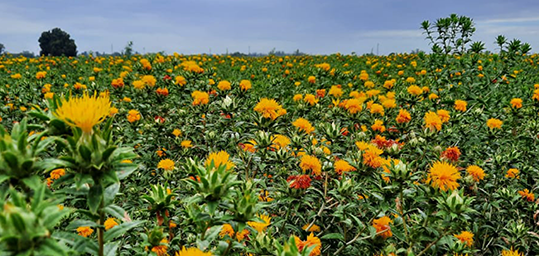
Moolec Science
The choice of host plant is one of the most important decisions a molecular farming company can make. While most focus on developing one crop at a time, some, like Moolec Science, have adopted a broader approach. By diversifying its platform with three plant varieties – soy, pea, and safflower – Moolec is able to optimize its output for a range of applications, making it a key player in the PMF market.

Henk Hoogenkamp, Co-Founder & Chief Product Officer, explains the vector system and transformation method used to introduce target genes into their host plants. “Our approach employs sophisticated vector constructs featuring seed-specific promoters, translational enhancers, and optimized terminators, which enable us to express animal heme proteins such as myoglobin at levels exceeding 25% of the total soluble protein in seeds,” he reports. “We utilize industry-standard transformation methods including Agrobacterium and particle bombardment for the delivery of DNA into the plant nucleus, ensuring efficient integration and robust, stable gene expression.” This efficiency ensures stable expression levels across different batches, with thorough screening tools and field trials utilized to respond to different environmental conditions that might impact that consistency.
By working with plants that have a naturally high protein content to start with, the purification process is simplified as well. “Our philosophy is to avoid purification where possible, because our high-yield expression direction in the seed matrix allows the target protein to naturally integrate into the base product’s functionality,” Hoogenkamp explains. “For seed oils, the extraction process itself acts as a concentration step to increase both the target protein and general protein content, as exemplified by our safflower system where the target is in the oil fraction. This enables us to deliver premium oil enriched with high-value gamma linolenic acid through industry-standard crushing and refining.” With the USDA APHIS Regulatory Safety Review for its three different plant types successfully completed, Moolec is now focused on building its safety protocols to pave the way for market launch, while maintaining product integrity throughout the supply chain. Although details of discussions with potential partners remain confidential, Hoogenkamp can reveal a recent accomplishment in an off-take agreement with one of the largest global consumer packaged goods and pet food companies. Positive feedback on its samples from other key players in the industry has undoubtedly given Moolec a confidence boost as well.
When asked how he sees molecular farming evolving over the next five years, Hoogenkamp’s outlook is similarly far-reaching. “Molecular farming is poised for a transformative leap, and we anticipate a dual-track evolution: one stream dedicated to high-value, small-scale molecules, and another focused on large-scale crop enhancement with minimal additional processing. With our safflower and soy platforms already positioned to rival traditional ingredients, we are driving a new era in food security and sustainability,” he states.
Growing a revolution
As technology advances, molecular farming’s potential is gaining recognition in the food industry and among consumers, making it an exciting time for companies in the sphere. “We want the industry to see molecular farming as a modern, scalable solution to sustainable protein production,” Hoogenkamp says. “Misconceptions from outdated GM debates no longer hold sway, as our technology decouples output traits from legacy concerns. Delivering targeted, high-value proteins that stabilize and democratize the animal protein supply is supported by our commitment to strict identity preservation and stewardship programs ensuring traceability and quality control.”
Misconceptions rooted in outdated debates over GM technologies no longer hold sway, as our technology decouples output traits from legacy concerns
By leveraging scalable soybean production, industrial capabilities, and existing agricultural infrastructure, Moolec gains a competitive edge. The faster it expands, the sooner its products reach consumers – its ultimate goal.
“We are thrilled for consumers to experience the breakthrough of affordable, sustainably produced animal proteins integrated into everyday foods,” Hoogenkamp concludes. “Our technology promises to revolutionize protein access without compromising cost, paving the way for a more sustainable, future-proofed food system.”
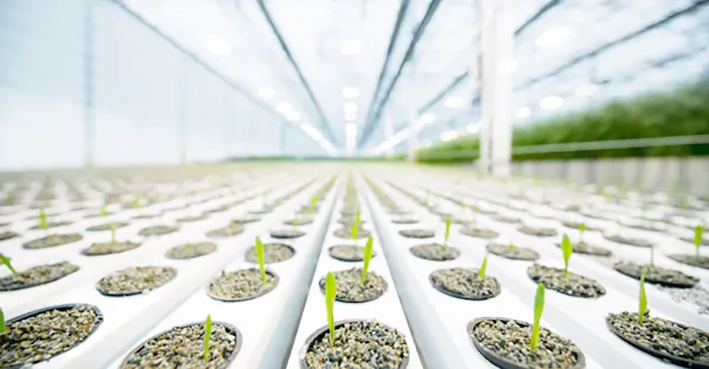
ORF Genetics
In the windswept landscapes of Iceland, ORF Genetics is quietly revolutionizing the future of food. While the world debates sustainable protein sources, the company has spent nearly 25 years perfecting a molecular farming technology that could hold the key to affordable cultivated meat. The company’s secret weapon? Barley – an unassuming crop that might just redefine how the world produces proteins.
“From the outset, our vision was to use plants to produce unique proteins,” reveals Dr Björn Örvar, Co-founder & Chief Scientific Officer. “We chose barley as a result of its natural advantages. The barley seed processes proteins efficiently, and when stored, the proteins remain intact for extended periods – ideal for large-scale applications.”

ORF’s journey began in 2001, when molecular farming was still considered niche. Örvar, who completed his PhD in molecular genetics at the University of British Columbia, believed that plants could serve as low-cost bioreactors. Unlike traditional systems that rely on E. coli or yeast, barley offers the unique advantage of scalability. It can be cultivated on a large scale, even in Iceland’s harsh climate, without competing for prime agricultural land. Plus, barley’s biological and ecological containment properties prevent cross-pollination, enabling field cultivation without invasive risks.
ORF Genetics’ proprietary ‘Orfeus’ expression system uses barley grain to produce recombinant proteins, notably growth factors under its ISOkine brand. These serve multiple markets, including medical research, skincare, and now cultivated meat – a sector that shows long-term growth potential.
“When we launched our MESOkine portfolio of animal growth factors in 2020, it was a tough sell,” recalls Örvar. “Startups were accustomed to highly purified growth factors from E. coli or yeast. Convincing them to switch to plant-based alternatives that weren’t highly purified was challenging.”
Growth factor gains
To overcome skepticism, ORF offered free samples, allowing startups to compare its growth factors with traditional options. This strategy paid off. Today, ORF collaborates with several cultivated meat companies, including the Australian innovator Vow, which has successfully launched products in Singapore and Hong Kong using ORF’s products. “We’re proud to be part of Vow’s journey,” says Örvar. “They’re an incredible company with a bold vision.”
The scalability of ORF’s system sets it apart, with the entire production process designed with large-scale operations in mind. “We’ve always prioritized scalable technology,” Örvar maintains. “Our modular, low-tech approach allows us to produce volumes that few others in the industry can match. We’ve set ambitious goals for our production capacity and are well on track to achieve them.”
But ORF is not stopping at production. The company is positioning Iceland as a global hub for cultivated meat innovation. ORF invites startups to hold tasting events in Iceland, capitalizing on the country’s positive governmental support. “We’ve hosted multiple tasting events here, providing startups with the chance to engage stakeholders and showcase their products,” Örvar says. “The Icelandic government has been incredibly supportive, and we see a future where Iceland becomes a leading center for both testing and producing cultivated meat.”
Reflecting on ORF’s journey so far, Örvar notes one unexpected challenge: the persistence of GMO skepticism. “In the early 2000s, we avoided developing plants with agricultural traits due to the strong anti-GMO sentiment,” he reports. “Honestly, I didn’t expect the debate to last this long. Despite overwhelming scientific consensus on GMO safety, public and political resistance remains.”
The Icelandic government has been incredibly supportive, and we see a future where Iceland becomes a leading center for both testing and producing cultivated meat
Nonetheless, ORF is forging ahead. The company’s discovery that animal growth factors do not need to be highly purified for cultivated meat production has proven transformative. This reduces downstream processing costs significantly, making cultivated meat more economically viable.
“The potential applications for plant-based recombinant proteins are immense,” Örvar concludes. “By continuing to refine our platform and collaborating closely with industry leaders, we aim to play a key role in shaping sustainable and innovative protein production.”
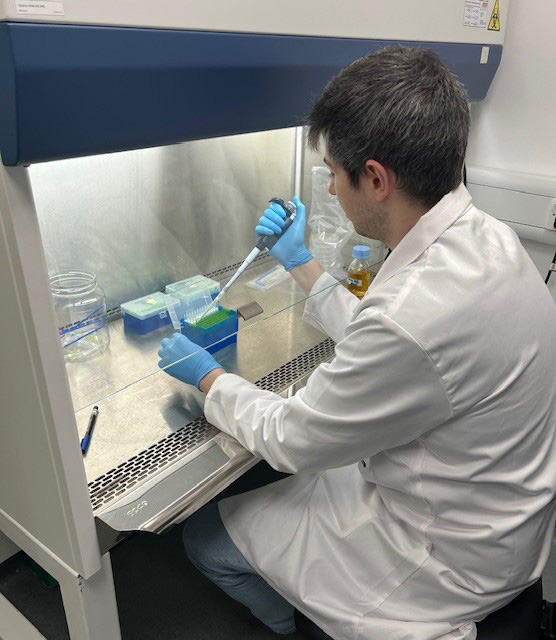
Kyomei
“We observed a world of companies relying on highly complex and costly technologies – bioreactors, lab-based approaches, and complicated downstream processes – to create food,” observes Meir Wachs, CEO of the UK-based PMF specialist, Kyomei. “We believed there had to be a better way. Our idea was to leverage plants as a production platform,” he says. The goal? Transform existing agricultural systems rather than create entirely new ones. “We asked ourselves, ‘Can we transform our existing systems instead of building new ones based on vats and bioreactors?’ That was our starting point – a kind of mind experiment on how to rethink food production.”

Wachs’ unconventional path into biotechnology adds depth to Kyomei’s narrative. “I’m not a plant scientist by training – I have no background in plant science. My background is in entrepreneurship. I launched my first company at 20 in the USA and sold it a few years later. After that, I took a long hiatus, studied philosophy and theology in England, but eventually, I got a bit bored – and hangry – for a new challenge. I didn’t want to just sell widgets again. I wanted to make a global impact. That’s when I connected with my co-founder, Kyoko Morimoto, at Oxford, and together, we came up with this idea.”
Leafy advantage
Kyomei distinguishes itself through its unique focus on edible leafy greens – specifically the leaves. “Many molecular farming companies focus on soybeans or other cash crops. We chose leafy greens not only as they’re edible but also their potential for tapping into waste streams from existing crops,” Wachs notes. “This approach allows us to generate significant value while minimizing waste.”
A key differentiator for Kyomei lies in its plant transformation techniques. “We primarily use biolistics because our focus is on the plastid, which makes this method more effective for our needs. That said, it’s not a one-size-fits-all process. We use a variety of techniques depending on the plant part we’re transforming.”
But technology alone isn’t enough. “The real challenge is figuring out how to extract protein profitably. We developed our own in-house downstream process, including bespoke reagents and buffers optimized for our proteins. Unlike many others, we co-extract multiple food ingredients from the same plant. Our approach minimizes waste and maximizes value by capturing multiple valuable components rather than focusing on just one molecule.”
Scaling remains a key challenge. “Lab-scale processes don’t always translate economically at commercial scale. We constantly balance scalability, economic viability, and market readiness,” says Wachs. Time is also crucial, he notes. “The biggest promise – and peril – of molecular farming revolves around time. Developing the right variety and integrating it into germplasm is slow, but when results come, the impact can be transformational.”
If you look at how quickly genetically modified crops were adopted in the USA, there’s no reason why molecular farming shouldn’t follow a similar trajectory
Kyomei’s success also stems from strategic collaborations. “We’ve engaged in partnerships with large CPG companies, startups, and leading academic institutions. We’ve worked with Mondelēz International’s RSSL, the University of Cambridge, and startups such as Lypid in Taiwan, as well as some of the largest farming operations in the UK and Europe.”
Despite early setbacks – such as a downturn in the market for meat proteins – Kyomei remains resilient. “It was like getting punched in the face. We validated the technology, but the market fell out from under us. In retrospect, it was a valuable wake-up call. It forced us to reassess and recognize the broader applications of our platform.”
Looking ahead, though, Wachs remains optimistic. “The potential for fundamental transformation in agriculture is enormous. If you look at how quickly genetically modified crops were adopted in the USA, there’s no reason why molecular farming shouldn’t follow a similar trajectory. Once the formula for scaling and commercial viability is cracked, the potential for widespread adoption is massive.”
With its multi-product platform and clear vision, Kyomei is set to lead the molecular farming revolution. As Wachs concludes, “We’re building something that can transform land use, supply chains, and agriculture on a global scale.”
If you have any questions or would like to get in touch with us, please email info@futureofproteinproduction.com
More Features

Feeding change

Protein Pioneer: Kesha Stickland








